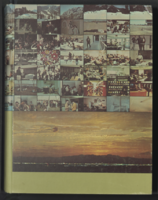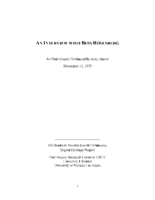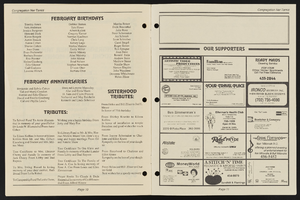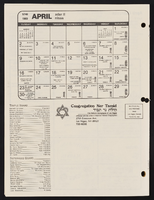Search the Special Collections and Archives Portal
Search Results

Transcript of interview with Frank Cope by Marianne Johnson, March 15, 1978
Date
Archival Collection
Description
Text

Transcript of interview with Suzette Cox by Lance Cooper, March 1, 1979
Date
Archival Collection
Description
Text

Transcript of interview with George Burns by Sandy Fink, April 03, 1976
Date
Archival Collection
Description
Text

Epilogue: UNLV Yearbook, 1970
Date
Description
Yearbook main highlights: schools and departments; detailed lists with names and headshots of faculty, administration and students; variety of photos from activities, festivals, campus life, and buildings; campus organizations such as sororities, fraternities and councils; beauty contest winners; college sports and featured athletes; and printed advertisements of local businesses; Institution name: University of Nevada, Las Vegas
Mixed Content

Transcript of interview with Bess Rosenberg by Jerry Masini, November 12, 1975
Date
Archival Collection
Description
Interview with Bess Rosenberg by Jerry Masini on November 12, 1975. In this interview, Rosenberg describes coming to Las Vegas in 1942, and the desert landscape. She gives an in-depth recollection of the first atomic test, and talks about different weather and the seasons in Las Vegas. Rosenberg describes several clubs and hotels around downtown and the recreation at Lake Mead and Mount Charleston.
Text

Mariteresa Rivera-Rogers oral history interview: transcript
Date
Archival Collection
Description
Oral history interview with Mariteresa Rivera-Rogers conducted by Maribel Estrada Calderón on October 24, 2018 for the Latinx Voices of Southern Nevada Oral History Project. In this interview, Mariteresa discusses her early life in Concepción, Chile. She talks about her experience moving to Las Vegas, Nevada in 1965, the immigration process at the time, and becoming a Spanish language court interpreter. Rivera-Rogers recalls enrolling at the University of Nevada, Las Vegas' (UNLV) Sam Boyd School of Law, and her involvement with the Latino Bar Association. Lastly, Rivera-Rodgers discusses the challenges in translating Spanish language to English.
Text

Don Perry interview, March 05, 1978: transcript
Date
Archival Collection
Description
On March 5th, 1978, Karen Croteau interviewed Don Perry (b. 1928 in Clarksburg, West Virginia) about Paiute Indians and life on a reservation. Perry begins by mentioning his own Indian heritage with a Cherokee mother and his wife’s Paiute heritage. Perry focuses on his conversations with his wife’s grandmother, who lived on the Paiute reservation since birth, from who he learned about the reservations history. He particularly delves into the traditions of Indian burials, governing on the reservation, and the difference between an Indian reservation and an Indian colony. Additionally, he talks about recreation on the reservations, education of Paiute Indians, and how reservations have changed. Throughout the interview, Perry gives personal anecdotes about his life in connection to the Paiute people and his experiences with their traditions and belief systems. Perry ends by discussing governing politics of the Paiute reservation and the start of Las Vegas as a gambling town.
Text

Rabbi Sanford Akselrad oral history interview: transcript
Date
Archival Collection
Description
Oral history interview with Rabbi Sanford Akselrad conducted by Barbara Tabach on March 7, 2018 for the Remembering 1 October Oral History Project. In this interview, Rabbi Sanford Akselrad discusses the response of the Jewish community of Congregation Ner Tamid to the October 2017 mass shooting in Las Vegas, Nevada. He discusses the healing service he led the day after the shooting, how the community paid respect to the victims, and the concert held to raise money. In addition to the actions of the Jewish community, Rabbi Akselrad discusses the congregation's work with the interfaith community to heal from this tragedy.
Text


